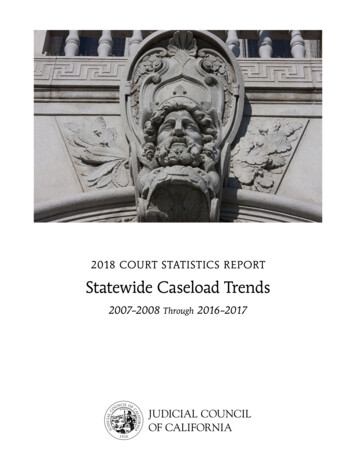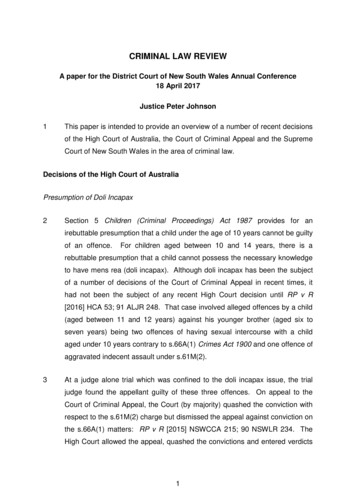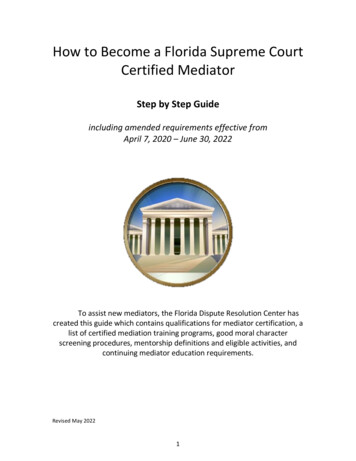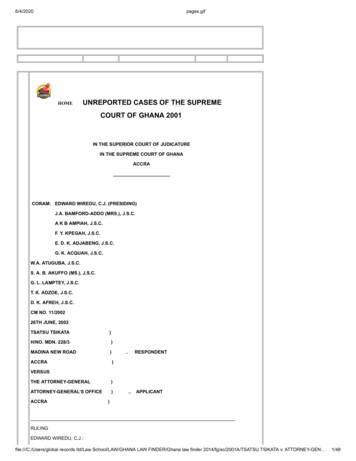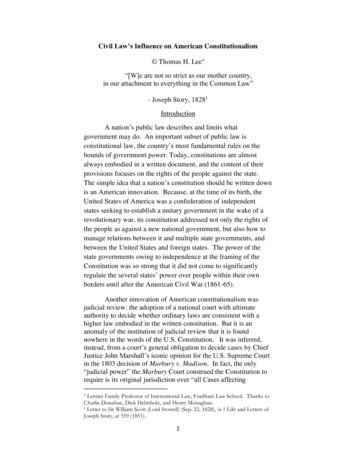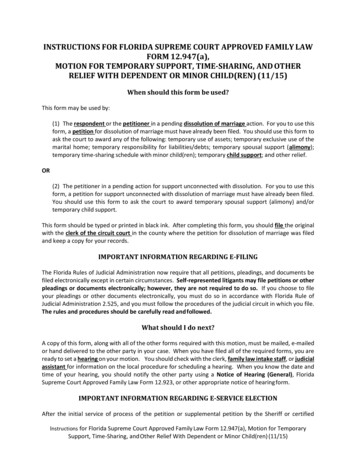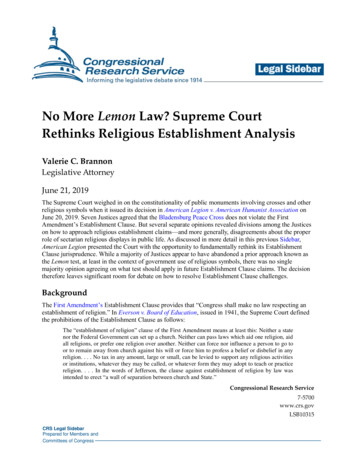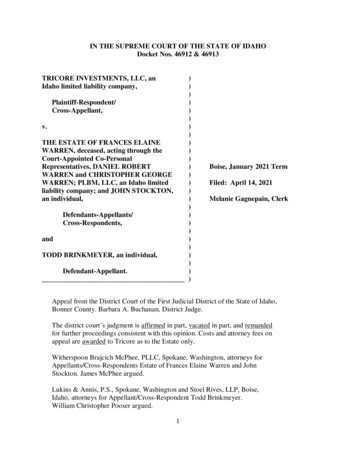
Transcription
IN THE SUPREME COURT OF THE STATE OF IDAHODocket Nos. 46912 & 46913TRICORE INVESTMENTS, LLC, anIdaho limited liability )v.))THE ESTATE OF FRANCES ELAINE)WARREN, deceased, acting through the)Court-Appointed Co-Personal)Representatives, DANIEL ROBERT)WARREN and CHRISTOPHER GEORGE)WARREN; PLBM, LLC, an Idaho limited)liability company; and JOHN STOCKTON,)an nts,))and))TODD BRINKMEYER, an individual,))Defendant-Appellant.))Boise, January 2021 TermFiled: April 14, 2021Melanie Gagnepain, ClerkAppeal from the District Court of the First Judicial District of the State of Idaho,Bonner County. Barbara A. Buchanan, District Judge.The district court’s judgment is affirmed in part, vacated in part, and remandedfor further proceedings consistent with this opinion. Costs and attorney fees onappeal are awarded to Tricore as to the Estate only.Witherspoon Brajcich McPhee, PLLC, Spokane, Washington, attorneys forAppellants/Cross-Respondents Estate of Frances Elaine Warren and JohnStockton. James McPhee argued.Lukins & Annis, P.S., Spokane, Washington and Stoel Rives, LLP, Boise,Idaho, attorneys for Appellant/Cross-Respondent Todd Brinkmeyer.William Christopher Pooser argued.1
Roberts Freebourn, PLLC, Spokane, Washington and Featherston Law Firm,Sandpoint, Idaho, attorneys for Respondent/Cross-Appellant. Brent Featherstonand Kevin Roberts argued.BEVAN, Chief JusticeThis appeal arises from a contract dispute. The Estate of Frances Elaine Warren (“Estate”)entered into a purchase and sale agreement with Tricore Investments, LLC (“Tricore”) involvingreal property near Priest Lake in Bonner County, Idaho. However, before closing, the Estate soldthe property to other buyers: John Stockton and Todd Brinkmeyer. Tricore filed a complaintagainst the Estate for breach of contract and violation of the Idaho Consumer Protection Act(“ICPA”), among other things, and sought specific performance of the purchase and saleagreement. The complaint also alleged that Stockton and Brinkmeyer tortiously interfered with thepurchase and sale agreement and that the Estate, Stockton, and Brinkmeyer (collectively,“Appellants”) engaged in a civil conspiracy.The Estate asserted a statute of frauds defense, which the district court dismissed onsummary judgment. The case proceeded to a bench trial where the district court made thesefindings: 1) the purchase and sale agreement between the Estate and Tricore constituted a validand enforceable contract; 2) the Estate breached the contract when it sold the property to Stocktonand Brinkmeyer; 3) the Estate’s actions violated the ICPA; 4) Stockton and Brinkmeyer tortiouslyinterfered with the contract; and 5) the Appellants engaged in a civil conspiracy. The district courtordered specific performance of the contract but declined to award any additional damages. Thedistrict court awarded Tricore its fees and costs against Appellants on a joint and several basis.Additionally, the district court granted Appellants’ motion to stay enforcement of the judgmentpending appeal and required Appellants to post a supersedeas bond.The Estate and Stockton jointly appealed. Brinkmeyer appealed separately. The Estateargues the purchase and sale agreement is not a valid, enforceable contract because it violates thestatute of frauds and there was no meeting of the minds. In the alternative, the Estate argues it didnot breach the contract because Tricore repudiated it. The Estate also argues it did not violate theICPA. Stockton and Brinkmeyer argue they did not tortiously interfere with the purchase and saleagreement. Together, Appellants argue they did not engage in a civil conspiracy and that thedistrict court’s attorney fee award against them on a joint and several basis was erroneous.2
Brinkmeyer alone appeals the supersedeas bond amount. Tricore cross-appealed. Tricore arguesthe district court erred in failing to award damages for the Estate’s violation of the ICPA and forStockton and Brinkmeyer’s tortious interference.We consolidated the appeals of the Estate, Stockton, and Brinkmeyer for purposes of thisopinion, even though the two appeals were argued and briefed separately. We affirm in part andreverse in part.I. FACTUAL AND PROCEDURAL BACKGROUNDFor decades, the Warren family owned real property near Priest Lake in Bonner County,Idaho. The property included undeveloped lake frontage and wetlands. Around 1990, Bill andElaine Warren sold a portion of their property to Brinkmeyer’s parents. Around the same time,Bill and Elaine sold another portion of their property to Stockton. Before the Warren and Stocktonsales closed, the Warrens asked Stockton if they could move the already agreed upon property line.In return, the Warrens promised Stockton they would come to him first if they were going to sellany of their property in the future, which Stockton characterized as a right of first refusal. Theproperty line was moved, but the parties never memorialize the promise in writing. Shortly after,Bill Warren passed away. Elaine Warren passed away in 2003. The Estate was formed afterElaine’s passing and her sons, Dan and Chris Warren, serve as the Estate’s co-personalrepresentatives.In 2014, plagued by the property’s back taxes, the Estate obtained a loan on the property.The Estate then decided to sell some of its property and use the proceeds to pay back the loan whenit became due. On May 20, 2014, John Finney, the Estate’s legal counsel, emailed Stockton aboutthe Estate’s interest in selling. Attached was a plat map of the property, which included threeparcels: Parcels A, B, and C. At that time, the Estate was seeking to sell Parcel B, which includedaround forty-five acres and was appraised around 5,200,000. Finney explained that the Estatewas “willing to sell Parcels A and C if a buyer want[ed] to take on the responsibility of platting awaterfront parcel for [Chris and Dan Warren] . . . .” Stockton made no offer on any of the Warrenproperty at that time. About a year later, Finney again emailed Stockton. In that email, Finneyexplained that the Estate was listing the Warren property at “a purchase price closer to the range[Stockton] indicated [he was] comfortable with” when the two previously communicated. Again,Stockton declined to purchase any of the Warren property.3
On July 2, 2015, the Estate retained Teague Mullen 1 as its real estate agent to assist in thesale of Parcel B. The seller representation agreement provided Parcel B was around forty-five acresand set a listing price of 2,000,000. Clifford Mort, the owner of Tricore, seeing substantialdevelopment opportunities in the property, became interested in purchasing the listed property. OnOctober 6, 2015, the Estate entered into a purchase and sale agreement with Tricore. Tricore’soffer was contingent on its ability to perform a feasibility study. Tricore had forty-five days toconduct the feasibility study but could extend that time for additional earnest money. Theagreement also required the Estate to provide Tricore with all historical information on theproperty within those forty-five days.Sometime between October 6, 2015, and November 11, 2015, the parties entered into thefirst addendum to the purchase and sale agreement. The first addendum incorporated the terms ofthe original purchase and sale agreement and included more definite legal descriptions of theproperty being sold. The first addendum also listed the property’s restrictive covenants andencumbrances, none of which disclosed any right of first refusal to Stockton. Tricore, however,did not “put up the earnest money” because the Estate failed to provide Tricore with enoughinformation to move forward in the process.Despite falling out of contract with the Estate, Tricore remained interested in purchasingthe property. Tricore continued to work with Mullen–negotiating a purchase of all of the Warren’swaterfront property from the Estate. The negotiations were fruitful, leading Tricore and the Estateto enter into the second addendum to the original purchase and sale agreement on June 24, 2016.The original purchase and sale agreement, the first addendum, and the second addendum togetherform the Tricore Purchase and Sale Agreement (hereinafter, “Tricore PSA”). Pursuant to theTricore PSA, Tricore deposited 20,000 in earnest money and the earnest money becamenonrefundable on July 31, 2016, after the feasibility period ended.The Tricore PSA added Parcel A to the sale. Thus, the Estate agreed to sell Parcels A, B,and C, which comprised about sixty-five acres (hereinafter, the “Warren Property”). 2 The TricorePSA purchase price was 2,400,000. In addition, the Tricore PSA provided:1Mullen served as a dual agent representing both the Estate and Tricore.2To differentiate between the property subject to the Tricore PSA and the Warren’s property as a whole, the propertysubject to the Tricore PSA is hereinafter referred to as “Warren Property” and the Warren’s property as a whole isreferred to generally as “the property.”4
The Sellers reserve and retain from Parcel A and Buyer shall create in compliancewith Bonner County Planning and Zoning provisions and approval, a parcel(s) insize not less than 200 feet of waterfront (or two 100 foot parcels—consistent withBuyer’s development) adjacent to Tax 31 between the existing access road and thelake.The Tricore PSA’s closing date was September 9, 2016, but Tricore could extend that date bypaying additional earnest money.On August 5, 2016, the Estate provided Tricore a revised plat map of the Warren Property.The revised map divided the original three parcels into five parcels, Parcels A, B, C, D, and E. TheWarren Property remained unchanged. However, at that time, Mort came to understand that theTricore PSA did not include “all of the waterfront” of the property. The revised map showed thatapproximately three hundred feet of waterfront located at the east end of the property was notincluded in the sale. Instead, the Warren Property included most of the waterfront, as illustrateddirectly below by the highlighted area containing horizontal lines identifying Parcels A, B, and C,the parcels subject to the Tricore PSA.Recognizing that losing the additional waterfrontage changed the development process,Mort instructed his counsel, Chuck Lempesis, to negotiate with Finney on how to move the projectforward. Mort, Lempesis, and Finney met on August 9, 2016, to discuss the misunderstandingregarding the 318-feet of waterfront, as well as issues related to the existing water system, sewerservice, and fill materials for the wetlands. After that meeting, Mort proposed the following termsin an email to Lempesis:1)2) 2.1 million purchase price[.][The Estate] to grant to [Tricore] existing water system and all water rightsto the property.5
3)4)5)[The Estate] to grant to [Tricore] any necessary easement’s needed for allutilities and access to the property[.][The Estate] to allow [Tricore] up to 160,000 yards of sand/structural fillmaterial ([Tricore] to haul from [Tricore’s] pit property)[.][Tricore] to deposit additional 10,000 non refundable Property closingshall be extended to 12/31/16[.]Lempesis forwarded the email to Finney on August 17, 2016. Negotiations continued regardingthe Warren Property’s water system and the possibility of pricing fill material. On September 1,2016, Lempesis texted Finney asking if the Estate’s representatives would meet with Mort. In thattext, Lempesis stated, “[Mort’s] counter is 2.25 and a dollar a yard for dirt. This could go south.Are you available to meet[?]” Finney responded with a suggested time of 3:30 p.m. However, thatmeeting never occurred. In fact, no further meetings between the Estate and Tricore occurred.After learning about Tricore’s proposed development, and concerned about preserving theexisting characteristics of the area, Stockton and Brinkmeyer agreed to pursue purchasing theWarren Property. On September 2, 2016, Stockton and Brinkmeyer entered into a purchase andsale agreement with the Estate for the Warren Property for 2,500,000 (“Stockton PSA”). TheEstate, Stockton, and Brinkmeyer also signed an indemnification agreement in which Stocktonand Brinkmeyer agreed to indemnify the Estate up to 100,000 against any claims Tricore broughtagainst the Estate.On September 6, 2016, the Estate, Stockton, and Brinkmeyer closed on the Stockton PSA.Stockton and Brinkmeyer simultaneously assigned the Warren Property to Stockton’s limitedliability company, PLBM. 3 Also on September 6, 2016, Finney emailed Mullen and Lempesis,informing them that the Estate decided to proceed in a “different direction.” Lempesis, shocked bythe Estate’s unexpected termination, responded and explained that the Tricore PSA was a bindingagreement. Lempesis tendered another 10,000 to extend the deadline for closing to October 7,2016, as provided for in the Tricore PSA. Days later, Tricore independently discovered the Estatehad sold the Warren Property to Stockton and Brinkmeyer.Shortly after discovering these facts, Tricore filed a complaint against the Estate, PLBMand John Does 1-10. Tricore later amended its complaint naming Stockton and Brinkmeyer.Tricore alleged the Estate breached the Tricore PSA and violated the ICPA. Tricore also alleged3Stockton and PLBM will be collectively referred to as “Stockton” for purposes of this appeal unless otherwiseindicated.6
Stockton and Brinkmeyer tortiously interfered with the Tricore PSA and that the Estate, Stockton,and Brinkmeyer engaged in a civil conspiracy. Tricore sought specific performance of the TricorePSA. The Estate, Stockton, and Brinkmeyer answered separately, each asserting the affirmativedefense of the statute of frauds.Both Tricore and the Estate then moved for summary judgment as to the statute of frauds,with Tricore seeking to dismiss the Estate’s affirmative defense, while the Estate sought to enforceits defense. The district court, after consideration of the cross motions and a motion to reconsider,dismissed the Estate’s statute of frauds defense.The case proceeded to a six-day bench trial. The district court later issued its decision andorder. The district court found the Tricore PSA was a valid and enforceable contract, Tricore didnot repudiate the Tricore PSA, and the Estate breached the Tricore PSA by selling the WarrenProperty to Stockton and Brinkmeyer. The district court also found that Stockton and Brinkmeyertortiously interfered with the Tricore PSA, the Estate violated the ICPA, and the Appellantsengaged in a civil conspiracy. For a remedy, the district court found Tricore was entitled to specificperformance but no other damages. The district court subsequently awarded Tricore attorney feesand costs against the Appellants on a joint and several basis. Appellants moved the district courtto stay enforcement of the judgment. The district court granted the motion and ordered Appellantsto post a supersedeas bond in the amount of 672,426.30 with an additional amount of 362,069.61to compensate Tricore for its loss of use of the Warren Property during the appeal.The Estate and Stockton jointly appealed. Brinkmeyer also timely appealed. Tricore timelycross-appealed. For purposes of our decision, the appeals of the Estate, Stockton, and Brinkmeyer,together with Tricore’s cross-appeal, have been consolidated and this opinion will address all oftheir arguments, although some arguments were made solely by the Estate, Brinkmeyer, or Tricore.II. ISSUES ON APPEAL1.2.3.4.5.Whether the district court erred in granting summary judgment for Tricore on the Estate’sstatute of frauds defense.Whether the district court erred in finding the Tricore PSA was a valid and enforceablecontract.If the Tricore PSA was a valid and enforceable contract, whether the district court erred infinding that Tricore did not repudiate the Tricore PSA.Whether the district court erred in finding the Estate violated the ICPA.Whether the district court erred in finding Stockton and Brinkmeyer tortiously interferedwith the Tricore PSA.7
6.7.8.Whether the district court erred in finding the Estate, Stockton, and Brinkmeyer engagedin a civil conspiracy.Whether the district court abused its discretion by awarding Tricore fees and costs againstthe Estate, Stockton, and Brinkmeyer on a joint and several basis.Whether the district court abused its discretion by requiring the Estate, Stockton, andBrinkmeyer post an additional bond amount of 362,069.61 to compensate Tricore for itsloss of use of the property during this appeal.III. ISSUE ON CROSS-APPEAL1.Whether the district court erred in declining to award damages to Tricore for Stockton andBrinkmeyer’s tortious interference and for the Estate’s violation of the ICPA.IV. STANDARDS OF REVIEW“[T]he standard of review for this Court when reviewing a district court’s grant of summaryjudgment is well-settled: this Court uses the same standard properly employed by the district courtoriginally ruling on the motion.” Drakos v. Sandow, 167 Idaho 159, 162, 468 P.3d 289, 292 (2020)(internal quotations omitted).A moving party must support its assertion by citing particular materials in therecord or by showing the materials cited do not establish the absence or presenceof a genuine dispute, or that an adverse party cannot produce admissible evidenceto support the fact[s]. Summary judgment is improper if reasonable persons couldreach differing conclusions or draw conflicting inferences from the evidencepresented. Even so, a mere scintilla of evidence or only slight doubt as to the factsis not sufficient to create a genuine issue of material fact for the purposes ofsummary judgment.Trumble v. Farm Bureau Mut. Ins. Co. of Idaho, 166 Idaho 132, 140–41, 456 P.3d 201, 209–10(2019) (internal citations and quotations omitted). “[W]hen reviewing the grant or denial of amotion for reconsideration following the grant of summary judgment, this Court must determinewhether the evidence presented a genuine issue of material fact to defeat summary judgment.”Drakos, 167 Idaho at 162, 468 P.3d at 292 (quoting Ciccarello v. Davies, 166 Idaho 153, 159, 456P.3d 519, 525 (2019)).“Following a bench trial, this Court’s review is limited to ascertaining whether the evidencesupports the findings of fact, and whether the findings of fact support the conclusions of law.”Wilson v. Mocabee, 167 Idaho 59, 64, 467 P.3d 423, 428 (2020) (quoting Mortensen v. Berian,163 Idaho 47, 50, 408 P.3d 45, 48 (2017)). This Court will not set findings of fact aside unless thefindings are clearly erroneous. Id. “In view of this role, the trial court’s findings of fact will beliberally construed in favor of the judgment entered.” Id. (quoting Borah v. McCandless, 147 Idaho73, 77, 205 P.3d 1209, 1213 (2009)). “Findings of fact that are supported by substantial and8
competent evidence are not clearly erroneous—even in the face of conflicting evidence in therecord.” Lunneborg v. My Fun Life, 163 Idaho 856, 863, 421 P.3d 187, 194 (2018). “Substantialand competent evidence is relevant evidence which a reasonable mind might accept to support aconclusion.” Id. (quoting Kelly v. Wagner, 161 Idaho 906, 910, 393 P.3d 566, 570 (2017)).Idaho Appellate Rule 13(b) authorizes district courts to take certain actions during anappeal, such as issuing stays and requiring a supersedeas bond. Because the district court has theauthority, but is not required, to take such actions under I.A.R. 13(b), this Court reviews theseactions under an abuse of discretion standard. See In re Idaho Workers Comp. Bd., 167 Idaho 13,24, 467 P.3d 377, 388 (2020) (emphasis in original) (holding that I.R.C.P. 11.3(c), which provides“the court may dismiss . . .” is reviewed for an abuse of discretion because “[the rule] does notmandate the court to do either one. Rather, [the rule] provides that a court may dismiss the claimswith prejudice or may enter a default judgment, leaving the decision to the sound discretion of thedistrict court.”). An abuse of discretion inquiry considers whether the district court: “(1) correctlyperceived the issue as one of discretion; (2) acted within the outer boundaries of its discretion; (3)acted consistently with the legal standards applicable to the specific choices available to it; and (4)reached its decision by the exercise of reason.” Lunneborg, 163 Idaho at 863, 421 P.3d at 194.“This Court [also] reviews a district court’s award of attorney fees for an abuse of discretion.”Alsco, Inc. v. Fatty’s Bar, LLC, 166 Idaho 516, 533, 461 P.3d 798, 815 (2020).V. ANALYSISThe Estate, Stockton, and Brinkmeyer assert several alleged errors on appeal. The Estateargues the Tricore PSA is not a valid and enforceable contract. The Estate maintains the TricorePSA violates the statute of frauds and that there was no meeting of the minds between the Estateand Tricore. Alternatively, the Estate argues if the Tricore PSA is valid and enforceable, the Estatedid not breach the Tricore PSA because Tricore repudiated it. The Estate also argues it did notviolate the ICPA.Stockton and Brinkmeyer, relying on the Estate’s position that the Tricore PSA is invalidand unenforceable, argue the claim against them for tortious interference with contract isunsubstantiated. More, Stockton and Brinkmeyer argue that if the Tricore PSA is valid andenforceable, they did not tortiously interfere with it because they pursued purchasing the WarrenProperty in good-faith based on Stockton’s alleged right of first refusal.9
Together, the Estate, Stockton, and Brinkmeyer argue they did not engage in a civilconspiracy. As a result, Appellants argue the district court erred in awarding Tricore attorney feesand costs against them on a joint and several basis. Brinkmeyer alone argues the 362,069.61required to compensate Tricore for its loss of use of the property during this appeal was erroneousTricore cross-appeals. Tricore argues it should have been awarded monetary damages forStockton and Brinkmeyer’s tortious interference and for the Estate’s violation of the ICPA.A.The Tricore PSA does not violate the statute of frauds.Below, Tricore moved for partial-summary judgment asking the district court to dismissthe Estate’s statute of frauds defense. The Estate also moved for summary judgment asking thedistrict court to dismiss Tricore’s breach of contract claim arguing the Tricore PSA violated thestatute of frauds. The district court found there were triable issues of fact on the statute of fraudsdefense and denied both Tricore’s and the Estate’s motions. The Estate moved the district court toreconsider and argued that the reservation of “not less than 200 feet of waterfront” violated thestatute of frauds because it failed to describe the property reserved with exactness. Onreconsideration, the district court held that the Tricore PSA did not violate the statute of frauds anddismissed the defense.The Estate argues the district court erred in dismissing its statute of frauds defense. TheEstate maintains the description of “not less than 200 feet of waterfront” violates the statute offrauds because it fails to sufficiently describe the property being reserved. According to the Estate,“not less than 200 feet of waterfront” does not sufficiently describe the reserved property becauseit does not provide the exact size, dimensions, or location of the reserved property.Tricore asserts the Estate is barred from raising a statute of frauds defense because theEstate acknowledged the existence of the Tricore PSA. Analogizing to an oral contract, Tricoreasserts “[a] defendant’s admission of an unwritten contract during the course of litigation willprevent the defendant from relying upon the statute of frauds.” Peterson v. Shore, 146 Idaho 476,479, 197 P.3d 789, 792 (Ct. App. 2008). “[I]n order for an admission to operate to remove the barof the [statute of frauds], it must in fact be an acknowledgment of the contract alleged, whetherthe admission is contained in a complaint, responsive pleading, deposition, other testimony, orotherwise in a judicial proceeding.” Id. Thus, “[i]t must be clear from the defendant’s judicialstatement that there is an unqualified or unconditional admission of . . . facts which wouldconstitute the formation of a valid, oral contract.” Id. at 479–80, 197 P.3d at 792–93 (internal10
quotations omitted). When an admission “consists of statements merely confirming . . . that thedefendant had agreed to certain terms different from those alleged by the plaintiff, it will notoperate to remove the alleged contract” from the statute of frauds. Id. at 480, 197 P.3d at 793.Tricore’s argument is inapt because the Tricore PSA was in writing. In addition, the Estatedid not admit the existence of a valid and enforceable contract in any judicial proceeding. At allstages of litigation, beginning with its initial answer, the Estate argued the Tricore PSA was invalidand unenforceable. In response to Tricore’s partial motion for summary judgment, the Estateargued the Tricore PSA was invalid and unenforceable. In the motion for reconsideration, theEstate again argued the Tricore PSA was invalid and unenforceable. Even after the district courtdismissed the Estate’s statute of frauds defense, the Estate continued to argue the Tricore PSA wasinvalid and unenforceable on other grounds. In sum, arguing whether Appellants admitted thecontract “exists” is not really the point. The key is that they argued that it did not exist “as a validand enforceable contract.” Merely, arguing that a contract is invalid and unenforceable is nottantamount to admitting it exists. Thus, the record does not support a finding that the Estatesufficiently admitted the existence of the Tricore PSA in a judicial proceeding to remove the barof the statute of frauds.As to the merits of the defense, the district court ruled that the statute of frauds is satisfiedby the legal description contained in the PSA here. We agree. But before we reach that point, wevoice our concern whether the statute of frauds is even available to the Estate as a defense in thiscase. “By its plain language, [section 9-505] governs contracts or agreements . . . . Its purpose isto prevent false or fraudulent contract claims by forbidding disputed assertions of certain types ofcontracts without any written memorandum of the agreement.” McKoon v. Hathaway, 146 Idaho106, 111, 190 P.3d 925, 930 (Ct. App. 2008). The statute of frauds “is to shield persons withinterests in land from being deprived of those interests by perjury, not to arm contracting partieswith a sword they may use to escape bargains they rue.” Flight Sys., Inc. v. Elec. Data Sys. Corp.,112 F.3d 124, 128 (3rd Cir. 1997); see also Gibson v. Arnold, 288 F.3d 1242, 1247 (10th Cir.2002) (“[T]he purpose of the statute of frauds is to shield persons with interests [covered by thestatute] from being deprived of those interests by perjury, not to arm contracting parties with asword they may use to escape bargains they rue.”). The interest and purpose of the statute of fraudsis not served by the Estate using it as a sword against Tricore to escape its own breach of contract.It is telling that the Stockton PSA uses nearly the identical property description as contained in the11
PSA between the Estate and Tricore. Even so, Tricore failed to raise this question directly, and ourconcerns do not underpin the decision we announce today. They are noted simply as an additionalimpediment to the statute of frauds being used in the manner sought by the Estate.Idaho Code section 9-505 requires certain agreements to be in writing.Section 9-505, in relevant part, provides: In the following cases the agreement isinvalid, unless the same or some note or memorandum thereof, be in writing andsubscribed by the party charged, or by his agent. Evidence, therefore, of theagreement cannot be received without the writing or secondary evidence of itscontents:.4. An agreement for . . . the sale[] of real property, or of an interest therein[.]I.C. § 9-505(4). “[T]he great majority of courts have held that executory contracts and agreementsfor the sale of real estate must be complete and speak in definite terms of all the conditions, terms,and descriptions necessary to constitute the contract.” Lexington Heights Dev., LLC v.Crandlemire, 140 Idaho 276, 280, 92 P.3d 526, 530 (2004) (quoting Allen v. Kitchen, 16 Idaho133, 141, 100 P. 1052, 1055 (1909)). Thus, “a description of real property must adequatelydescribe the property such that it is possible for someone to identify ‘exactly’ what property theseller is conveying to the buyer.” The David and Marvel Benton Tr. v. McCarty, 161 Idaho 145,151, 384 P.3d 392, 398 (2016) (quoting Ray v. Frasure, 146 Idaho 625, 629, 200 P.3d 1174, 1178(2009)). “In order to exactly identify the property that is being conveyed, ‘a description . . . [mustbe written such that] quantity, identity, or boundaries can be determined.’ ” Id. at 153, 384 P.3d at400 (quoting Garner v. Bartschi, 139 Idaho 430, 435, 80 P.3d 1031, 1036 (2003)).In Ray, this Court tempered the notion that a sufficient property description, for the statuteof frauds, need only designate the land being conveyed with reasonable certainty. 146 Idaho at629, 200 P.3d at 1178. Instead, we noted that “a property description [must] designate ‘exactly’what property the seller is conveying to the buyer.” Id. at 629–30, 200 P.3d at 1178–79 (quotingGarner, 139 Idaho at 435–36, 80 P.3d at 1036–37). While the word “exactly” normally means “ina manner or measure or to a degree or number that strictly conforms to a fact or condition,” Exactly,MERRIAM-WEBSTER, https://www.merriam-webster.com/dictionary/exactly (last updated Feb. 1,2021), in the statute of frauds context “exactly” designates the “quantity, identity, or boundaries[that] can be determined” from the sales document itself, or by reference to extrinsic evidence towhich it refers. Id. Thus, we he
The Tricore PSA's closing date was September 9, 2016, but Tricore could extend that date by paying additional earnest money On August 5, 2016, the Estate provided Tricore a revised plat map of the Warren P roperty.


